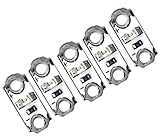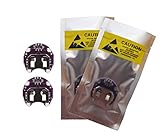Lilypad Coin Cell Battery Holder CR2032 Switch
Appliances
Arts, Crafts & Sewing
Automotive
Baby
Beauty
Books
CDs & Vinyl
Collectibles & Fine Arts
Cell Phones & Accessories
Clothing, Shoes & Jewellery
Computers
Electronics
Health & Personal Care
Home & Kitchen
Industrial & Scientific
Luggage & Travel Gear
Musical Instruments
Office Products
Patio, Lawn & Garden
Pet Supplies
Software
Sports & Outdoors
Tools & Home Improvement
Toys
Video Games









![Adafruit Stainless Medium Conductive Thread - 3 ply - 18 meter/60 ft [ADA641]](https://m.media-amazon.com/images/I/41GAdaniBkS._SL160_.jpg)


![Adafruit Stainless Thin Conductive Thread - 2 ply - 23 meter/76 ft [ADA640]](https://m.media-amazon.com/images/I/312I2qlnuWL._SL160_.jpg)




